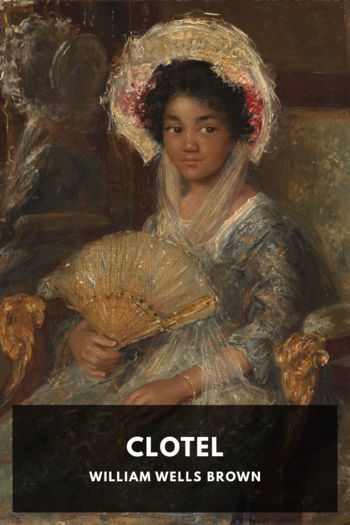Clotel, William Wells Brown [i like reading books .txt] 📗

- Author: William Wells Brown
Book online «Clotel, William Wells Brown [i like reading books .txt] 📗». Author William Wells Brown
An address, presented to Mr. William Wells Brown, the fugitive slave from America, by the ladies of Bolton, March 22nd, 1850:
Dear friend and brother—We cannot permit you to depart from among us without giving expression to the feelings which we entertain towards yourself personally, and to the sympathy which you have awakened in our breasts for the three millions of our sisters and brothers who still suffer and groan in the prison-house of American bondage. You came among us an entire stranger; we received you for the sake of your mission; and having heard the story of your personal wrongs, and gazed with horror on the atrocities of slavery as seen through the medium of your touching descriptions, we are resolved, henceforward, in reliance on divine assistance, to render what aid we can to the cause which you have so eloquently pleaded in our presence.
We have no words to express our detestation of the crimes which, in the name of liberty, are committed in the country which gave you birth. Language fails to tell our deep abhorrence of the impiety of those who, in the still more sacred name of religion, rob immortal beings not only of an earthly citizenship, but do much to prevent them from obtaining a heavenly one; and, as mothers and daughters, we embrace this opportunity of giving utterance to our utmost indignation at the cruelties perpetrated upon our sex, by a people professedly acknowledging the equality of all mankind. Carry with you, on your return to the land of your nativity, this our solemn protest against the wicked institution which, like a dark and baleful cloud, hangs over it; and ask the unfeeling enslavers, as best you can, to open the prison doors to them that are bound, and let the oppressed go free.
Allow us to assure you that your brief sojourn in our town has been to ourselves, and to vast multitudes, of a character long to be remembered; and when you are far removed from us, and toiling, as we hope you may be long spared to do, in this righteous enterprise, it may be some solace to your mind to know that your name is cherished with affectionate regard, and that the blessing of the Most High is earnestly supplicated in behalf of yourself, your family, and the cause to which you have consecrated your distinguished talents.
A most respectable and enthusiastic public meeting was held at Sheffield, to welcome Mr. Brown, and the next day he was invited to inspect several of the large establishments there. While going through the manufactory of Messrs. Broadhead and Atkin, silver and electroplaters, etc., in Love-street, and whilst he was being shown through the works, a subscription was hastily set on foot on his behalf, by the workmen and women of the establishment, which was presented to Mr. Brown in the countinghouse by a deputation of the subscribers. The spokesman (the designer to Messrs. Broadhead and Atkin) addressing Mr. Brown on behalf of the workpeople, begged his acceptance of the present as a token of esteem, as well as an expression of their sympathy in the cause he advocates, viz. that of the American slave. Mr. Brown briefly thanked the parties for their spontaneous free will offering, accompanied as it was by a generous expression of sympathy for his afflicted brethren and sisters in bondage.
Mr. Brown has been in England nearly four years, and since his arrival he has travelled above twenty thousand miles through Great Britain, addressed one hundred and thirty public meetings, lectured in twenty-three mechanics and literary institutions, and given his services to many of the benevolent and religious societies on the occasion of their anniversary meetings. After a lecture, which he delivered before the Whittington Club, he received from the managers of that institution the following testimonial:
Whittington Club and Metropolitan Athenæum,
189, Strand, June 21, 1850.
My dear sir,
I have much pleasure in conveying to you the best thanks of the Managing Committee of this institution for the excellent lecture you gave here last evening, and also in presenting you in their names with an honorary membership of the club. It is hoped that you will often avail yourself of its privileges by coming amongst us. You will then see, by the cordial welcome of the members, that they protest against the odious distinctions made between man and man, and the abominable traffic of which you have been the victim.
For my own part, I shall be happy to be serviceable to you in any way, and at all times be glad to place the advantages of the institution at your disposal.
I am, my dear sir,
Yours truly,
William Strudwicke, Secretary.
Mr. W. Wells Brown.
On the 1st of August, 1851, a meeting of the most novel character was held at the Hall of Commerce, London, the chief actors being American fugitive slaves. That meeting was most ably presided over by Mr. Brown, and the speeches made on the occasion by fugitive slaves were of the most interesting and creditable description. Although a residence in Canada is infinitely preferable to slavery in America, yet the climate of that country is uncongenial to the constitutions of the negroes, and their lack of education is an almost insuperable barrier to their social progress. The latter evil Mr. Brown attempted to





Comments (0)